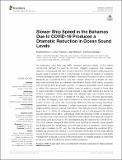Files in this item
Slower ship speed in the Bahamas due to COVID-19 produces a dramatic reduction in ocean sound levels
Item metadata
| dc.contributor.author | Dunn, Charlotte | |
| dc.contributor.author | Theriault, James | |
| dc.contributor.author | Hickmott, Leigh | |
| dc.contributor.author | Claridge, Diane | |
| dc.date.accessioned | 2021-08-31T09:30:10Z | |
| dc.date.available | 2021-08-31T09:30:10Z | |
| dc.date.issued | 2021-07-26 | |
| dc.identifier | 275627242 | |
| dc.identifier | 73f45954-4a55-4f63-aef7-4b6f2a0a89e8 | |
| dc.identifier | 85112642489 | |
| dc.identifier | 000679410800001 | |
| dc.identifier.citation | Dunn , C , Theriault , J , Hickmott , L & Claridge , D 2021 , ' Slower ship speed in the Bahamas due to COVID-19 produces a dramatic reduction in ocean sound levels ' , Frontiers in Marine Science , vol. 8 , 673565 . https://doi.org/10.3389/fmars.2021.673565 | en |
| dc.identifier.issn | 2296-7745 | |
| dc.identifier.other | RIS: urn:01E87D90DA6DB7CC1ED662F5B7038E45 | |
| dc.identifier.other | ORCID: /0000-0002-4274-7239/work/99116012 | |
| dc.identifier.uri | https://hdl.handle.net/10023/23872 | |
| dc.description | Funding for the purchase of SoundTrap hydrophones and associated field work came from Field School, Sabine and Reinhold Probst, M Rogers, The Devereux Ocean Foundation and The Bahamian Environment Protection Foundation. | en |
| dc.description.abstract | As underwater noise from ship traffic increases, profound effects on the marine environment highlight the need for improved mitigation measures. One measure, reduction in ship speed, has been shown to be one of the key drivers in reducing sound source levels of vessels. In 2017, a study began to assess the impacts of increasing commercial shipping traffic on sperm whales in Northwest Providence Channel, northern Bahamas, an international trade route that primarily serves the southeast US. Ship data were collected from an Automatic Identification System (AIS) station combined with recordings from an acoustic recorder to measure underwater sound levels and to detect the presence of sperm whales. Here we analyze a subset of these data to opportunistically investigate potential changes in ship traffic before and during the COVID-19 pandemic. These data span one calendar year from October 2019 to October 2020. A pre-COVID-19 dataset of 121 days, from a recorder approximately 2 km from the shipping route was compared to a 134-day dataset collected during COVID-19 from the same site, comprising 2900 and 3181 ten-minute recordings, respectively. A dramatic decrease in ocean noise levels concurrent with changes in shipping activity occurred during the pandemic. The mean pre-COVID-19 power density level in the 111–140 Hz 1/3-octave band was 88.81 dB re 1 μPa (range 81.38–100.90) and decreased to 84.27 dB re 1 μPa (range 78.60–99.51) during COVID-19, equating to a 41% reduction in sound pressure levels (SPL). After differences in seasonal changes in wind speed were accounted for, SPL decreased during the pandemic by 3.98 dB (37%). The most notable changes in ship activity were significantly reduced vessel speeds for all ship types and fewer ships using the area during the pandemic. Vessel speed was highly correlated to SPL and the only ship-based variable that predicted SPLs. Despite the opportunistic nature [i.e., not a standard before-after-control-impact (BACI) study], this study provides a unique opportunity to assess the effectiveness of ship traffic management strategies, such as slowing ships down, to mitigate impacts on marine life in the study area, including local sperm whale populations. | |
| dc.format.extent | 12 | |
| dc.format.extent | 1394350 | |
| dc.language.iso | eng | |
| dc.relation.ispartof | Frontiers in Marine Science | en |
| dc.subject | Automatic identification system | en |
| dc.subject | COVID-19 | en |
| dc.subject | Ecosystem health | en |
| dc.subject | Marine mammal | en |
| dc.subject | Noise | en |
| dc.subject | Ship speed | en |
| dc.subject | Shipping | en |
| dc.subject | Sperm whales | en |
| dc.subject | GC Oceanography | en |
| dc.subject | QH301 Biology | en |
| dc.subject | DAS | en |
| dc.subject | SDG 14 - Life Below Water | en |
| dc.subject.lcc | GC | en |
| dc.subject.lcc | QH301 | en |
| dc.title | Slower ship speed in the Bahamas due to COVID-19 produces a dramatic reduction in ocean sound levels | en |
| dc.type | Journal article | en |
| dc.contributor.institution | University of St Andrews. School of Biology | en |
| dc.contributor.institution | University of St Andrews. Sea Mammal Research Unit | en |
| dc.identifier.doi | https://doi.org/10.3389/fmars.2021.673565 | |
| dc.description.status | Peer reviewed | en |
This item appears in the following Collection(s)
Items in the St Andrews Research Repository are protected by copyright, with all rights reserved, unless otherwise indicated.

